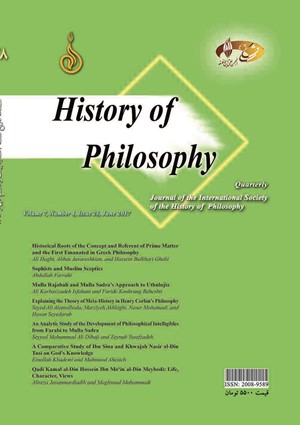-
-
List of Articles
-
Open Access Article
1 - foreword
Hossein Kalbasi Ashtari -
Open Access Article
2 - Historical Roots of the Concept and Referent of Prime Matter and the First Emanated in Greek Philosophy
ali haghi Abbas Javareshkian Hossein Bulkhari Ghahi -
Open Access Article
3 - Sophists and Muslim Sceptics
Abdullah Farrahi -
Open Access Article
4 - Mulla Rajabali and Mulla Sadra’s Approach to Uthulujia
Ali Karbasizadeh Isfahani Faride Koohrang Beheshti -
Open Access Article
5 - Explaining the Theory of Meta-History in Henry Corbin’s Philosophy
Seyed Ali Alamolhoda Marziyeh Akhlaghi Naser Mohamadi Hasan Seyedarab -
Open Access Article
6 - An Analytic Study of the Development of Philosophical Intelligibles from Farabi to Mulla Sadra
Seyyed Mohammadali Dibaji Zeynab Yusefzadeh -
Open Access Article
7 - A Comparative Study of Ibn Sina and Khwajah Nasir al-Din Tusi on God’s Knowledge
Einollah Khademi Mahmood Ahesteh -
Open Access Article
8 - Qadi Kamal al-Din Hossein Ibn Mo‘in al-Din Meybodi: Life, Character, Views
Alireza Javanmardi Adib Maghsoud Mohammadi
-
The rights to this website are owned by the Raimag Press Management System.
Copyright © 2017-2026







